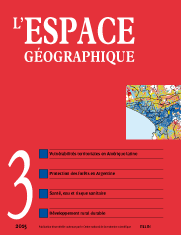

Marie GISCLARD, Benjamin LYSANIUK, Évelyne MESCLIER. Territory, a limited solution to problems of development
The appropriation of norms of sustainable development from the peripheral, rural territorial level in Mexico (1 fig.)
This paper addresses the logics and processes through which normative models aiming at organizing the production of public policies are appropriated and reformulated at the territorial level. We focus on sustainable rural development (SRD) policies, which provide relevant empirical illustrations of these processes of territorialization of public action in Mexico. Global norms of sustainable development are subject to multiple processes of interpretation, hierarchization and reformulation, involving actors at all levels of political and territorial organization. The paper pays special attention to how these processes are included within the long-term history of relations between these territories and public policy measures.
keyword: PATH DEPENDANCE, POLICY COALITION, PUBLIC POLICY, SOCIO-POLITICAL NETWORK, SUSTAINABLE DEVELOPMENT
The construction of territorial qualifications: An emerging issue in Latin America? (1 tabl.)
Using an economic approach to territory, this paper examines the relationship between territorial resources and the vulnerability of rural territories. We based the article on the analysis of Local Agri-Food Systems (LAFS) in Latin America, an analysis that underlines the activation of specific resources through a collective action aimed at defining a strategy of territorial development in rural zones. We also took into account similar contributions in the framework of the RTD/RIMISP program on rural territorial dynamics in Latin America. These papers help identify factors that enable certain rural areas avoid marginalization. We intend to show that the urban demand for the goods and services provided by these areas is an important element in the strengthening of local development.
keyword: LATIN AMERICA, LOCAL AGRI-FOOD SYSTEM, TERRITORY, URBAN DEMAND
Health at risk in the Global South (2 fig., 5 photos)
If we are to consider health as a resource that depends on the balance between several components of a system at any given time, understanding health risks necessarily involves a synchronous reading of all components of the system at different spatial and temporal scales. Using several examples – mainly in developing countries – we insist on the multi-scale nature of health risk territories and the ability of geographers to simultaneously consider individual or collective weaknesses in public health, at the local or the global scale. This article focuses primarily on the risk of malaria.
keyword: HEALTH RISK, MALARIA, TERRITORY, VULNERABILITY
Consequences of the establishment of the agro-industrial enterprises on the Peruvian piedmont coast (1 fig.)
Since the 1990s, Peru has faced significant changes in its rural areas. Indeed, the implementation of a liberal economy has facilitated the establishment of large agro-industrial areas, which are considered more apt to compete in globalized markets. Farmers and producers living on the Peruvian piedmont coastline for several generations must face the arrival of new players who weaken them and the mutation of their territories. We have therefore examined the vulnerability of small producers and how they cope with the situation. We have also studied the territories themselves in this new global context.
keyword: AGRIBUSINESS, PERU, TERRITORIAL CHANGE, VULNERABILITY
A principle of territorial solidarity in the heart of the forest law in Argentina (2 fig.)
The Forestry Legislation of Argentinia was designed to slow-down deforestation linked to the advance of the agricultural frontier. In a country marked by social and territorial inequalities, the law is based on a principle of solidarity between social groups and between areas within the same territory. This article observes the application of the law in the province of Chaco and questions the principle of territorial solidarity and its capacity to affect the social and environmental risks of deforestation. It shows that the objectives of the law are biased in order to support agricultural dynamics and to improve production in the most environmentally fragile regions.
keyword: ARGENTINA, DEFORESTATION, PUBLIC POLICY, TERRITORIAL SOLIDARITY
Territories and inclusion in the peripheries of Lima (Peru): An exploratory approach based on data about water supply and sewage disposal (9 fig., Attachments)
In the rapidly changing peripheries of the Lima metropolitan area, in Peru, we analyzed the mechanisms of inclusion, differentiation and exclusion in terms of access to water supply and sewage disposal. Our approach is based on a diversified corpus of data from statistics and fieldwork and explores the following hypotheses. Inequality in terms of access is linked to the lapse of time between urban expansion and the installation of services. They are tied to the differentiated possibilities available to residents to obtain these services, according to their socioeconomic condition. They are due to the fact that the State and the private actors intervene in these still rural spaces differently than in urban areas. These last processes imply the creation and the reshaping of territories.
keyword: EXPLORATORY APPROACH, INCLUSION, LIMA, PERIPHERY, TERRITORY
L’espace géographique 2/15![]()
![]() L’espace géographique 4/15
L’espace géographique 4/15
For subscribe or buy this issue: BELIN
![]() L’Espace géographique: contents
L’Espace géographique: contents
Last modified: december 17, 2015